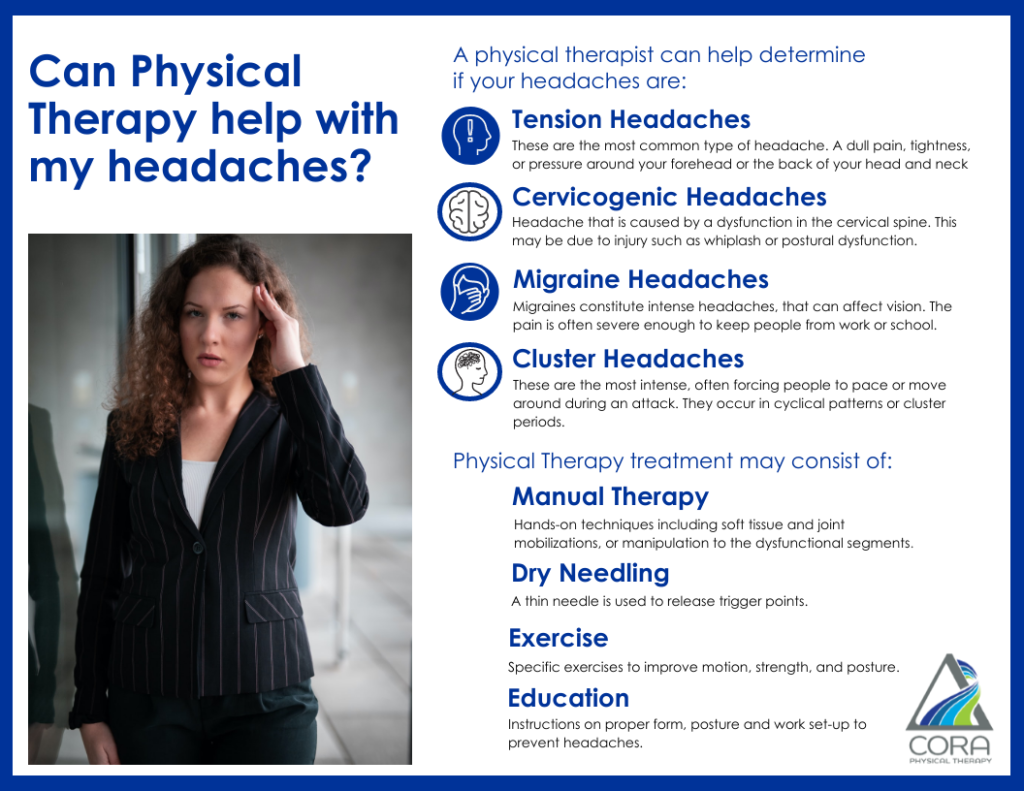
Written by Lucia Parisi Holsopple PT, OCS, Clinic Manager at CORA Physical Therapy Carrollwood, FL
Updated by Alexandra Guanco, DPT, OCS, CMPT, CORA Physical Therapy Orthopaedic Residency Coordinator
Nearly 50% of adults worldwide suffer from headache and migraine disorders, but physical therapy can provide relief.
Did you know June is National Migraine & Headache Awareness Month (#MHAM)? According to the World Health Organization, it is estimated that 50% of adults worldwide currently suffer from headache disorders.
The International Headache Society describes several different categories of headache. The most common types of primary headaches are: tension headaches, cervicogenic, migraines, and cluster headaches. There are also secondary headaches from an underlying condition including sinus disorders, fever, or an infection.
Thankfully, there is an effective treatment for almost every type of headache. Physical therapists can help determine the type of headache you have, and are experts in managing pain.
Types of Headaches and How Physical Therapy Can Help.
Tension-type headaches (also called muscle-spasm headaches) are the most common types of headaches in adults. They are often the result of a neck or jaw problem, poor posture, fatigue, or stress. The pain can be mild to intense and is often felt behind the eyes and in the head and neck. It may also feel like a tight band squeezing the head.
Cervicogenic headaches are the result of a dysfunction in your neck. This has been found to be related to the nerves in the upper cervical spine. The most common cause of upper cervical dysfunction is whiplash-related trauma from concussions and car accidents as well as from prolonged neck flexion–or poor posture. With an overwhelming number of people working from home, a poor computer set up can cause postural dysfunction that may lead to an onset of headaches. Home work stations often result in slouching, craning necks, and an overall decrease in good posture habits.
Migraines are a recurring type of headache. They can cause moderate to severe pain that can be throbbing or pulsing. It is often localized to one side of the head and can cause other symptoms such as nausea and sensitivity to light. The exact cause of migraines is still unknown. Hormonal changes and certain foods/drinks such as chocolate and alcohol can be triggers for migraines.
Cluster headaches are headaches that occur in bouts of frequent attacks and may be in clusters or patterns. The pain is typically the most severe of all of the headaches and can be accompanied by teary eyes and nasal discharge. It can cause intense pain around one eye and people often pace during an attack. The exact cause of these headaches is unknown.
Are you thinking twice about why you have been suffering from headaches more often lately? Fortunately, there is a solution, and your physical therapist can help.
Treatments for Headaches Decrease Frequency, Intensity, and Duration.
Your physical therapist may recommend a certain treatment based on the diagnosis and severity of pain you are experiencing. Treatments may include:
- Manual therapy: Your therapist will identify which specific upper cervical segments are dysfunctional through an exam. He or she may perform hands-on techniques including soft tissue mobilization or joint mobilizations or manipulation to the dysfunctional segments.
- Exercise: Specific exercises to cervical and scapular strengthening to improve range-of-motion and postural endurance and strength.
- Education: Your therapist will provide you with instructions on proper form, posture and work set-up to prevent headaches.
- Dry Needling: A thin needle is used to release trigger points.
Most patients treated conservatively with physical therapy see significant improvements in headache frequency, duration, and intensity within the first four weeks of therapy.

When Is It Time to Seek the Opinion of a Licensed Professional?
If your headaches are increasing in frequency or severity, or are interfering with usual activities such as work, exercise, or your social life then a licensed physical therapist can help! CORA Physical Therapy is staffed with physical therapists whose primary purpose is to diagnose and treat orthopedic conditions, including headaches.
Contact our clinic nearest you today and begin experiencing relief tomorrow with 24-48 hour scheduling. Complimentary screens are available. No strings attached – only your health!
